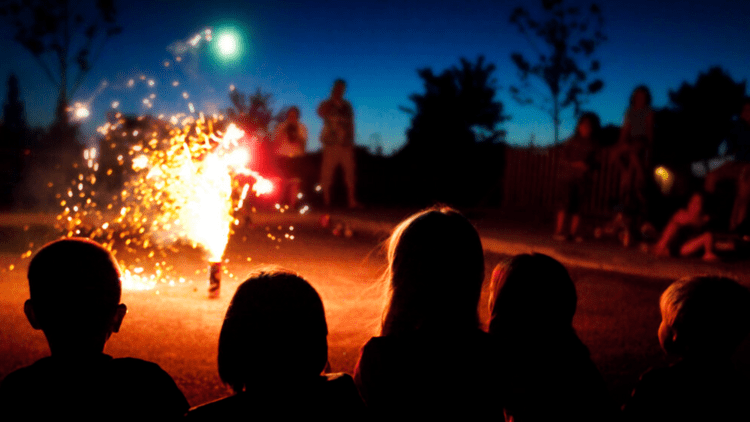
Fireworks can add a splash of color and excitement to any celebration, but they also come with risks like burns and injuries, fire outbreaks and harm to pets. Here are some facts about fireworks from the National Fire Protection Association:
- Fireworks start around 19,500 fires annually.
- Most firework injuries are to the eyes, hands, fingers or legs.
- Children ages 10 to 14 have the highest rate of firework injuries.
- Sparklers cause 25% of injuries leading to emergency room visits.
For perspective, sparklers can burn as hot as 1,200 F. That’s hotter than the temperature needed to melt glass. Sparklers burn quickly, but it doesn’t take much time to cause damage. Sparklers can quickly ignite clothing and severely burn people and pets. A dropped sparkler could cause a house fire or brush fire.
Because of statistics like these, many states have made possessing or igniting fireworks illegal.
Safety should be the guiding principle as you plan your home firework displays. Taking a few simple precautions can prevent accidents and make celebrations memorable for all the right reasons.
Make sure fireworks are legal
Before purchasing or using fireworks, ensure they’re legal in your area. Check local ordinances and state laws, too. Even if fireworks are legal in your state, they might be banned in your community. If you choose to use fireworks, follow safety recommendations from the Department of Homeland Security:
Purchase fireworks from reliable sources
Buy your fireworks from licensed and reputable shops or dealers. This will help ensure you’re getting products that meet safety standards. Only buy ones that are rated for home use.
Keep a safe distance
Designate a clear, flat area away from buildings, vehicles, pets, kids and flammable materials for the firework launch area. If you’re using ground-based fireworks (like a fountain), keep spectators at least 35 feet away. For aerial fireworks, keep spectators 150 feet away from the launch.
Igniting fireworks
Never allow children to handle or light fireworks.
Keep fireworks on the ground and away from people and animals. Use a stem lighter such as a grill lighter. Ignite fireworks one at a time. Never place a part of your body directly over a firework or hold a firework in your hand while lighting it.
Check for wildfire risk in your area
Obey red flag warnings in your area. The National Weather Service issues red flag warnings when there is an elevated risk for wildfires, like low rainfall and windy conditions. If you’re unsure of the risk, don’t chance it. It only takes one spark to start a blaze.
Douse fireworks that don’t explode
If a firework doesn’t ignite successfully, douse it with water and discard it. Let it sit for 10 minutes to avoid a delayed explosion. Then put it in a water bucket. Never look into the firework to inspect why it didn’t go off. You could be severely injured or killed.
Safety equipment and apparel
Use fireworks outside and have buckets of water or a hose connected to an open water source nearby. Wear safety goggles and nonflammable clothing. Avoid loose apparel that can catch fire easily.
Avoid alcohol when using fireworks
Alcohol and fireworks are a dangerous combination. Only operate fireworks when you’re sober.
Keep pets away from fireworks
Fireworks can be stressful for pets. They don’t understand the noise and lights are for fun. They might panic and try to escape. As a result, your display or spectators could be harmed. Keep your pets indoors when shooting off fireworks. Close the windows and draw the curtains to reduce noise and visuals. Turn on the TV or radio to help relax them. Maintain a safe space, ensuring they have access to their favorite toys, bedding and treats.
Alternatives to fireworks
Some cities opt for coordinated drone laser shows as an ecofriendly alternative to traditional fireworks. But don’t go hosting your own drone laser event until you check with local and state laws. You need to make sure you’re not violating any regulations.
If you decide to go firework-free, here are some alternatives to try:
- Glow sticks (These can glow for hours and be worn anywhere.)
- Noisemakers (You can buy them at the store or make them yourself. Use old plastic containers or water bottles filled with birdseed or any other noisy things.)
- Bubble machines (Amplify the experience after dark by making your own glow-in-the-dark bubbles using dish soap, glycerin and water-based glow paint.)
- Outdoor movie display (You can use your movie projector to display a broadcast of a firework show or have an outdoor movie night.)
- Paint-filled water balloons (Hang an old sheet, tarp or shipping box to explode your paint balloons onto. Use water-soluble paint and tell your guests to dress appropriately!)
- Water soluble rice paper confetti cannons (Check the labels to ensure the paper confetti is water soluble.)
This isn’t an exhaustive list. You can start a new decorating or craft tradition instead of fireworks. Searching online for “firework alternatives” provides plenty of ideas to suit your needs.
Your home insurance may not cover firework accidents
Your home insurance policy may not cover a firework-related incident, including fires and medical liability to others. This is especially true if you cause injury or damage where fireworks are illegal. You risk legal penalties and fines.
Abandoning home firework use can reduce injuries and keep your home and neighbors’ homes safe. Leave the fireworks to the professionals and try some alternatives to keep your home party safe and festive.
